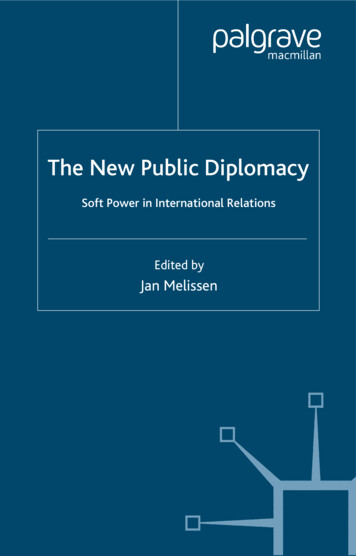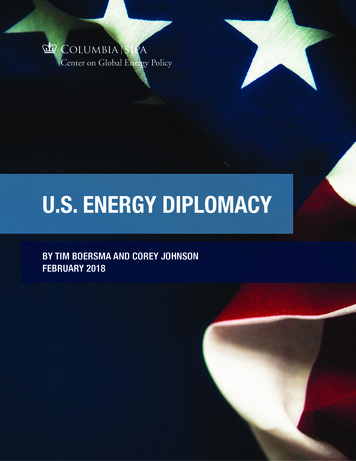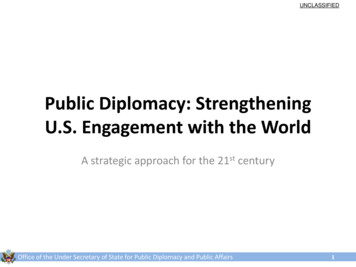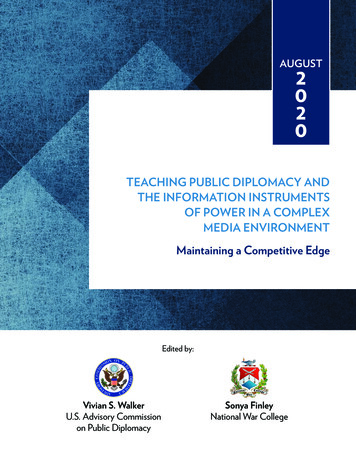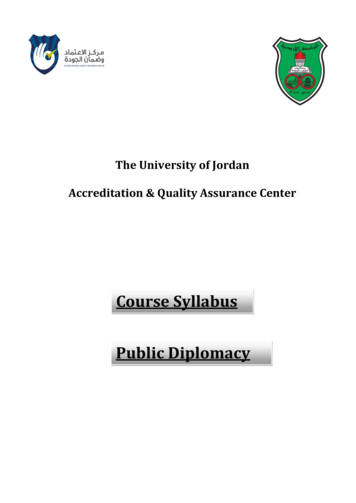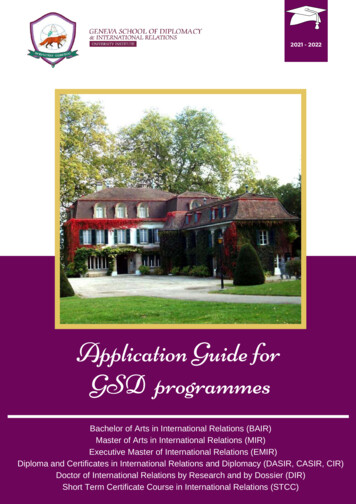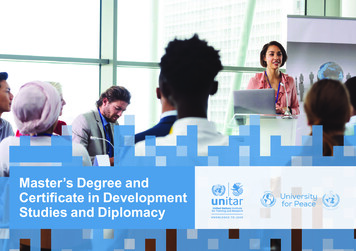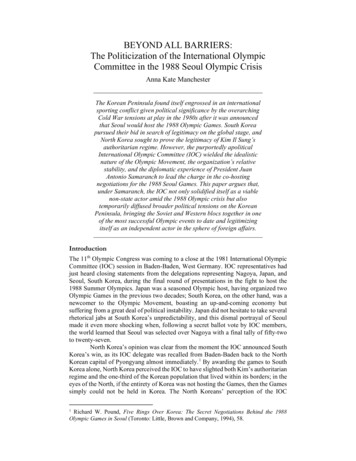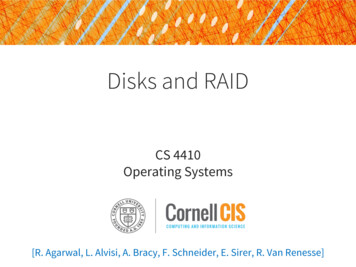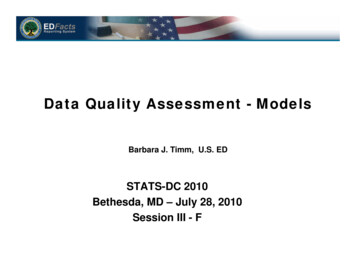
Transcription
DataDiplomacyUpdating diplomacy to the big data eraBarbara Rosen Jacobson,Katharina E Höne and Jovan KurbalijaFebruary 2018
DiploFoundation7bis Avenue de la Paix1201 Geneva, SwitzerlandPublication date: February 2018For further information, contact DiploFoundation at data@diplomacy.edu
Table of contentsAcknowledgements.3Executive summary.4Introduction.81. The key concepts of data diplomacy. 111.1 An introduction to data diplomacy. 111.2 The basics of big data. 131.2.1 Data in a historical perspective. 131.2.2 Data, information, knowledge. 131.2.3 Data science and big data. 141.2.4 Algorithms. 171.3 Chapter summary. 192. The use of big data in international affairs.212.1 Big data and the core functions of diplomacy.222.1.1 Information gathering and diplomatic reporting.222.1.2 Negotiation.252.1.3 Communication and public diplomacy.272.1.4 Consular affairs.292.2 Big data and trade.302.3 Development data.312.3.1 Big data for the Sustainable Development Goalss.312.3.2 Big data for development projects.322.3.3 Big data for tracking aid flows, monitoring and evaluation.332.4 Emergency response and humanitarian action.332.4.1 Mobile records and social media data for emergency response.342.4.2 Availability and access to data.352.4.3 Reliability and representativeness of communication data.352.4.4 Privacy considerations.352.5 The use of big data in International law.362.5.1 Social media data in international courts.362.5.2 Geospatial data in international courts.362.6 Chapter summary.371
3. Organisational considerations for the MFA.423.1 Data-driven organisation?.423.1.1 Features of data-driven organisations and their relevance for MFAs.423.1.2 Types of roles in data-driven organisations.433.1.3 Organisational goals and knowledge management.433.2 Organisational culture and organisational adaptations.443.2.1 Organisational culture.443.2.2 Possible organisational adaptations to support communication and cross-disciplinary teamwork.453.3 Potential for partnerships. 473.4 Capacity building.483.5 Chapter summary.514. Key aspects concerning the use of big data.534.1 Access to data.534.1.1 External open data.544.1.2 Internal open data.544.1.3 External closed data.554.1.4 Internal closed data.564.2 Data quality.564.2.1 Complexity.564.2.2 Completeness.574.2.3 Timeliness.574.2.4 Accuracy.574.2.5 Relevance.574.2.6 Usability.574.3 Data interpretation.574.3.1 Correlation vs. causation.574.3.2 Selection bias.584.3.3 Politicised data.584.4 Data protection.594.4.1 General data protection issues.594.4.2 Community identifiable information and discrimination.594.4.3 Legal framework.604.4.4 Data protection vs. public interest.604.5 Data security. 614.5.1 Technological solutions. 614.5.2 Countering behavioural challenges.624.6 Chapter summary.625. Conclusion.655.1 Capturing opportunities, recognising limitations, mitigating challenges.655.2 Finding the right balance for effective data diplomacy.665.2.1 The private and public sector: Detecting transferable lessons and avoiding false optimism.665.2.2 Promises and perils: Is big data always worth the cost?. 675.2.3 Big data velocity and the speed of policy-making: Race cars in slow lanes. 675.2.4 Diplomacy between continuity and change, data and expertise.685.3 Future frontiers for data diplomacy research.68Annex: Methodology.702
AcknowledgementsThis report was commissioned by the Policy Planning andResearch Unit at the Finnish Ministry of Foreign Affairs.We would like to express our gratitude to a number of people who were instrumental in making this report a reality.Both the practice of and the reflections on big data diplomacy are very much in their infancy. Few ministries offoreign affairs (MFAs) have begun to apply big data toolsor to think about the implications of big data for the conduct of diplomacy. As such, it was critical for our researchto speak to those that already practice big data diplomacy.Therefore, we are, first and foremost, grateful to our interviewees for taking the time to talk about the emergingtopic of big data diplomacy and for sharing their experiences, including their successes and struggles. We wouldlike to express our gratitude to Ms Rania Alerksoussi(Coordinator, Federation-wide Databank at InternationalFederation of Red Cross and Red Crescent Societies), MrEinar Bjørgo (Manager, UNOSAT), Ms Marianne Fosland(Director of the Section for Information Management,Norwegian Ministry of Foreign Affairs), Mr Ole-MartinMartinsen (Head of the Section for Analysis Support andKnowledge Management, Norwegian Ministry of ForeignAffairs), Mr Graham Nelson (Head of the Open Source Unitof the UK FCO), and Mr Simon Pomel (Chief Data Strategist,Departmental Delivery Unit, Global Affairs Canada).Over the course of 2017, we held two workshops on (big)data diplomacy, supported by the Ministry of Foreign3Affairs of Finland. The first workshop, Data diplomacy:mapping the field, was held in April in Geneva, and thesecond workshop, Data diplomacy: Big data for foreignpolicy, took place in October in Helsinki. The discussionsat both workshops were extremely insightful and helpfulin directing us towards some of the key issues and questions in big data diplomacy. Although we cannot name allthe workshop participants, we are grateful for their contributions in giving presentations, leading discussions, andasking crucial questions of us and our emerging research.We would like to express our gratitude for the constantsupport, encouragement, and flexibility of the PolicyPlanning and Research Unit at the Ministry of ForeignAffairs of Finland, and in particular Mr Antti Kaski, MsSini Paukkunen, Mr Ossi Piironen and Ms Salla Pietarinen.For support in researching and finalising this report, weare grateful for our colleagues at DiploFoundation, inparticular Mr Aleksandar Nedeljkov, Mr Arto Väisänen,Ms Aye Mya Nyein, Ms Hannah Slavik, Ms Jelena Dincic,Ms Marilia Maciel, Ms Mary Murphy, Ms Mina Mudric, MsStefania Pia Grottola, and Mr Viktor Mijatovic. Specialthanks to Dr Jovan Kurbalija for always reminding us tolook for a broader perspective and a relevant angle fordiplomacy. Together, we constructed a practical reality outof a hype and untangled the complexity of big data intosomething that we hope can serve as a means of practical orientation for MFAs and practitioners of diplomacy.
Executive summaryData is often described as a critical resource of modernsociety, or even the oil of the new economy. Vast amounts ofdata are generated every day through the use of electronicdevices and the Internet. The private sector has begun toharness big data sources to improve their products and services, streamline procedures, and ultimately increase revenues. Big data analysis is said to create insights that werehitherto unavailable. What is the position of diplomats, whorely on data and information in their everyday work, in thischanging environment? Some ministries of foreign affairs(MFAs) and international organisations are tentativelyexploring the uses of big data for policy planning, knowledge management, development, humanitarian action, andemergency response, recognising the potential benefits.Yet, there is still a large number of perceived obstacles thatprevent others from stepping on board the big data train.This report aims to increase the awareness of the opportunities, limitations, and challenges of the big data trend,and to understand how MFAs could adapt their work, procedures, and organisational structures to the big data era.In this report, we provide a broad overview of the mainopportunities of big data in different diplomatic fields andfunctions, and highlight the key issues that need to beaddressed for big data diplomacy to flourish. This framework of possibilities and constraints opens up a diversityof applications and implications that can be exploredin further detail, and is meant to inform MFAs that areexploring big data to adapt diplomatic practice to the datadriven era where possible and feasible.How can big data be understood in the frameworkof diplomacy?Characteristics of big data: Although a contested concept, most definitions focus on the size and heterogeneous characteristics of the datasets, and the currentspeed at which the data is generated, requiring newtools for analysis, compared to more traditional sourcesof data. This is often related to the so-called four V’s ofbig data – volume, velocity, variety, and veracity.Output of big data: Other definitions focus on thenew kind of information and knowledge that can beproduced through big data, often taking the form oftrends, patterns, and correlations.Big data in data diplomacy: This report focuses onautomatically generated data of relevance for diplomacy, including online data, sensor data, satellite data,and textual data. Through the generation of trends,patterns, and correlations, these new data sourcescan contribute to diplomatic functions and areas,while their technical characteristics provide severalkey considerations that need to be mitigated for bigdata’s effective use in diplomacy.How can we understand the concept of datadiplomacy?Data diplomacy – tool, topic, environment: Big datainteracts with diplomacy in three ways. First, big datacan be used as a tool to make diplomacy more efficient,effective, and inclusive. Second, it provides a new topicon the diplomatic agenda and features in internationalnegotiations in areas such as cross-border privacy,e-commerce, and international cybersecurity, to namea few. Third, it is a factor that changes the very environment in which diplomacy operates, potentially shifting geopolitical and geo-economic positions. Whilethis comprehensive approach falls largely outside ofthe scope of this report, it can be further developed infuture research.Big data as a tool for diplomacy: In this research, wefocus on gathering, analysing, and integrating big datain negotiations, reporting, consular protection, andother diplomatic activities, while looking at the limitations and other key considerations that need to bemitigated to allow big data to flourish.How does big data impact the core functions ofdiplomacy?Core functions of diplomacy: We looked at four diplomaticcore functions in the context of big data – informationgathering and diplomatic reporting, negotiation, communication and public diplomacy, and consular affairs.4
Information gathering and reporting: Informationgathering is likely to be one of the areas that will bemost affected by big data. Big data opens up newsources and new ways of analysis, from social mediadiscourse to government open data and geospatialinformation, which can feed into policy-making andstrategy. The digitalisation of diplomatic reports similarly provides new opportunities to analyse and detectpatterns in the conduct of diplomacy. Ultimately, bigdata can serve to provide new insights, challengebiases, and corroborate information.Negotiation: Negotiation is a fundamentally humanendeavour. Big data can play a role by providing relevant arguments and insights to understand counterparts and support the development of negotiationpositions and strategies. These insights might be especially important in the prenegotiation phase. Further,big data insights could provide common ground byadding external information that might be consideredmore objective, such as satellite images, on whichagreements can be built.Communication and public diplomacy: Generallyspeaking, the biggest promise of big data in the areaof communication lies in the ability to understand patterns and trends in discourse, to tailor messages, andto measure the effectiveness of a communication campaign. Public diplomacy has adapted to the opportunities of digital technologies, and in particular socialmedia, to become more effective in communicatingwith foreign and domestic publics. Diplomats areincreasingly able to use these tools in new ways andimprove their understanding of foreign and domesticdiscourse, as well as the effectiveness of the reach andengagement of their own messages.Consular affairs: With experience in data management and a role in service delivery, consular affairsmight well be the area to benefit from big data. Withincreased demands from the public in its interactionwith governments, consular departments are underpressure to keep up with the latest big data opportunities to optimise their online services. Big data can support consular functions in making use of internal datato improve consular service delivery, using innovativebig-data-supported means to locate citizens in need,and using (social) media monitoring to react faster to oreven predict crises and the need for consular services.What is the role played by big data in variousdiplomatic fields?Big data and trade: Statistics and data have long beenat the core of trade promotion and economic diplomacy. Big data provides new possibilities to monitorand evaluate trade flows, especially with the advent ofe-money, e-banking, and e-commerce.Big data and development: With its ability to trackpatterns over time and space, big data can be ofgreat value for development. In particular, big datacould help track progress towards the SustainableDevelopment Goals (SDGs), by providing additionalinput for its indicators. For example, sensor and satellite data can be used for monitoring climate change,financial transactions can shine a light on economicdifferences between social groups, and social mediadata can help detect patterns in discrimination. Still,there is a need for a better understanding of how bigdata can be smoothly integrated into existing monitoring efforts. Big data in the development sector is alsoexplored to assess the needs of beneficiaries, track aidflows, and monitor and evaluate programmes.Big data and humanitarian affairs: As some forms ofbig data can become available rapidly, almost in realtime, they may be able to assist in responding to quicklyunfolding emergencies and humanitarian action, andfeed into early warning systems. The analysis of communication channels, such as mobile phone recordsand social media, is particularly valuable in detectingabnormalities and engagement on topics that couldindicate emergencies. Yet, in these volatile contexts,it is more important than ever to ensure privacy andthe proper managing and protection of personal data.Big data and international law: As societies becomeincreasingly dependent on digital tools and services,they leave behind an array of data, which could betransformed into new forms of accountability andevidence. International courts are now exploring howto use these traces, such as social media messages,e-mails, and geospatial data, to serve internationallaw. These new sources open up new questions onthe technical tools that are needed in internationallaw to analyse big data, especially on how to verify theauthenticity of such content.Areas of big data potential: Big data can contribute toa number of diplomatic fields and functions, albeit indifferent ways. To generalise, we have identified six5
ways in which big data could benefit diplomacy andthe corresponding fields and functions for which theyare most relevant: Providing new information and challenge bias(information gathering and reporting). Meeting the expectations of government servicedelivery (consular affairs). Better understanding people’s perceptions andbehaviour (communication, public diplomacy,and negotiation). Tracking programmes and progress over timeand space (trade and development). Tracking developments over short timeframes(humanitarian affairs and emergency response). Identifying new forms of evidence and accountability (international law).How does big data analysis fit within theorganisational culture of the MFA?Big data as a tool, not a panacea: Big data is a tool tosupport good foreign policy. It does not aim to replaceexpert knowledge with automatisms.Need for subject knowledge and context: Expertswith subject knowledge, based on years of experience, are needed more than ever in the data-drivenera because big data that is not embedded in its propercontext can be dangerously misleading.Establishing a big data unit: The big data unit shouldhave a cross-cutting function and be able to serve avariety of regional and thematic departments in theMFA. It should be relatively small, diverse (consistingof data scientists as well as diplomats), and free toinnovate and experiment.Fostering exchange through big data champions:Appointing data champions within relevant departments and units can promote communication betweenthe big data unit and the wider MFA in order to both disseminate big data insights, and to better understandthe concrete needs of various departments and therole big data can play in addressing these.What kinds of partnership are needed to update theMFA to the data-driven era?Reasons for entering into partnerships: Partnershipswill play an important role due to a lack of internal capacity and the challenges associated with internal retrainingor hiring. Partnerships, especially with the business sector, will also facilitate access to otherwise restricted data.Further, building sustainable long-term relationshipswith relevant institutions, especially in the private sector and academia, can be another driver for partnership.Emphasis on concrete benefits over technicaldetails: The idea that big data analysis is only accessible to those with the relevant technical or programming skills needs to be countered by presenting theresults of big data analysis, as opposed to talking aboutmethodology, and by emphasising the contribution thatthese results can make to better foreign policy.Outsourcing big data analytics: Several reasons contribute to the potential need for outsourcing big dataanalytics. In-house knowledge in relation to data science is, in most cases, still lacking. The demand fordata scientists on the job market is outpacing thesupply of highly qualified professionals. Outsourcingcan save resources and be more cost-effective.Outsourcing increases flexibility and can be helpful iflonger-term commitments to new units or a changedorganisational structure are not yet plausible.Carefully crafted relationships: Carefully craftedrelationships between those working quantitativelyand those working qualitatively within the MFA areimportant. Exchange and collaboration should be fostered where possible, while respecting the unique contribution of each.Need for a minimum of in-house capacities: Comparedto the private sector, there are important limitations forthe MFA related to the utility of outsourcing big dataanalyses. Especially when it comes to sensitive issues,it is advisable that MFAs develop their own in-housebig data analysis capacities.How can the MFA adapt to meaningfully include bigdata practices and insights?Keeping the aim in sight: Decisions about organisational transformation need to be driven by the goalof making better decisions and contributing to betterforeign policy.How can capacity-building needs in big datadiplomacy be addressed?Identifying needs: Existing capacities and capacitygaps need to be carefully identified, keeping in mindthat not every diplomat needs to have the same levelof familiarity with big data.6
Offering different levels of training: With regard tocapacity building in data diplomacy at the individuallevel, we suggest a three-tier structure, which reflectsthe different levels of expertise required. Foundation level: able to assess the challengesand opportunities of big data with a generalknowledge of big data diplomacy. Practitioner level: able to work with big data toolsand techniques to verify and find information. Expert level: able to design and implementappropriate big data tools for diplomatic insight.Bridging worlds: The question of capacity buildingin big data diplomacy is also a question of enablingand supporting communication between two differentworlds – the world of the data scientist and the worldof the diplomat.Enabling the best possible use of big data tools insupport of the work of diplomats: Ultimately, the aimof organisational change and capacity building is notto transform diplomats into data scientists. Rather, theaim of all such efforts should be to highlight wherebig data can make a contribution to diplomatic practiceand to support the work of diplomats through makingthe best possible use of the available tools.What key considerations need to be mitigated fordiplomacy to capture the potential of big data?Big data can provide important opportunities for theMFA, from knowledge management and informationgathering to monitoring programmes, understandingdiscourses, and delivering services. These opportunities are captured through organisational measures,such as creating a unit, forging partnerships, or engaging in capacity development. Yet, there are a numberof practical considerations that need to be tackled inorder for t
Data Diplomacy Updating diplomacy to the big data era February 2018 Barbara Rosen Jacobson, Katharina E Höne and Jovan Kurbalija. DiploFoundation 7bis Avenue de la Paix 1201 Geneva, Switzerland Publication date: February 2018 For further information, contact DiploFoundation at data@diplomacy.edu. 1
